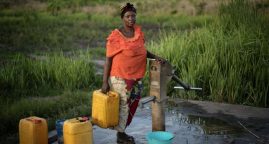(Politico) We need to get lifesaving aid to millions trapped behind Ukraine’s front lines
Building on the success of the Black Sea grain deal, the UN should seize every opportunity to engage in humanitarian negotiations with Kyiv and Moscow.
On the cusp of 2023, the United Nations warned that the number of people in need of humanitarian relief worldwide increased by almost a quarter compared to a year ago. It’s an uptick that’s been driven by climate change, the ongoing impact of COVID-19, high inflation and food prices — and the war in Ukraine.
In Ukraine itself, the conflict’s toll on civilian lives has been immense: Over 17,800 civilian casualties — a figure that’s almost certainly an underestimate; over 13 million forced from their homes; and over $127 billion in damages to civilian infrastructure, including schools, hospitals, community centers, residential buildings and shopping centers.
But while international funding for the humanitarian response in Ukraine has been immense, especially compared to the sharp underfunding of aid in other places like Afghanistan, Yemen and Somalia, millions of Ukrainians still remain cut off from lifesaving assistance. This isn’t due to inadequate funding — it’s because humanitarian organizations like Mercy Corps, which I lead in Ukraine, cannot reach people trapped behind active front lines, living in Russian-controlled territories.
Following Ukrainian gains in the latter half of 2022, Russia’s forces now control about 18 percent of the country — an area with an estimated population of over 4 million. The U.N. classifies these areas under Russian control as suffering the most severe level of humanitarian need. And although it’s hard to gather accurate information on the conditions there, eyewitness reports speak of a lack of access to clean water or health care; closed shops and a lack basic necessities; even if stores are open, spiking prices or thriving black markets; and many simply without the money to buy what they need to survive.
So, why isn’t aid getting in?
Much like civilians themselves, aid deliveries aren’t able to cross in or out of Russian-controlled territories with any ease. Along the entire front line — 965 kilometers long — there’s currently only one conditionally operational crossing point. In a field near the southern city of Zaporizhzhia, thousands queue outdoors for days to get in or out, facing mistreatment, extortion and possible detention. And even this crossing is now often closed.
In order to reach millions of vulnerable people, aid organizations need political action to open up greater humanitarian access to these areas.
For this, we need a legal framework that permits and encourages humanitarian action. In a positive move, the Ukrainian Parliament, the Rada, proposed legalizing humanitarian action in Russian-controlled areas in September 2022, ending an ambiguity that had increased risks for the brave groups crossing the line. But more needs to be done by the U.N. and third parties to ensure this holds on both sides of the conflict.
We also need humanitarian crossing points established along the front line. The tenuous crossing at Zaporizhzhia needs to be fully opened and monitored. And while the prospect of establishing more crossing points may appear unlikely, here we can take lessons from a multilateral deal struck last year that’s already working — the grain export agreement for Black Sea ports. Though shaky, it appears to be holding.
Blockades. Incessant shelling. Lines of control. Front lines. Sadly, these aren’t new or unique to Ukraine. Yet, as humanitarians, we must find a way across and beyond them — a way to do as much as possible to save lives and alleviate suffering, no matter where vulnerable civilians are located.
This is essential, and it is international humanitarian law — nothing should override it.
Political leaders, mediating via the U.N., need to rediscover purposeful humanitarian diplomacy, and they need to open access to the millions of civilians who are at grave risk not only when they’re in the crossfire of conflict, but also when they’re stuck behind a line drawn by military forces. Building on the success of the Black Sea grain deal, the U.N. should seize every opportunity to engage in humanitarian negotiations with Kyiv and Moscow, as it has successfully done in the past across other front lines in Syria and Yemen.
A new multilateral deal could enable genuine humanitarian actors to be verified and allowed access to Russian-controlled areas. And monitoring by accredited, neutral third parties could act to reduce corruption and aid-diversion, just as they have in the grain deal.
These solutions are always fraught with risk and are often fragile and imperfect. But they can and must be attempted if the international goodwill toward the Ukrainian people isn’t to fail its sternest test at this stark milestone.
The laws of war, including guaranteeing humanitarian assistance, must be upheld — the lives of over 4 million people trapped behind frontlines depend on it.
Related Articles
Population fleeing from war: rescue, assistance and integration towards the world humanitarian summit
11/11/2015 . The press conference organised by the Order of Malta: challenges and prospects of the migratory phenomenon
Princes and bankers and aid! Oh my!
05/26/2017. Despite external criticism and some of their own internal discomfort, more humanitarians are engaging with the World Economic Forum than ever before and see such spaces as critical for solving today’s complex crises.
More than 31 million people displaced within their own country in 2016
2017 Global Report on Internal Displacement (GRID) published on 05/22/2017. “In 2016, one person every second was forced to flee their home inside their own country.





